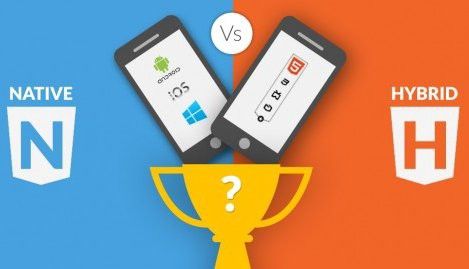Native vs Hybrid Application

Everyone knows how the app is important in every business. Nowadays mobile applications have become a necessity for most of the business including retail, education and legal. Every business owner wants to build mobile applications mostly for business growth or more reach. This becomes a new way of marketing big business.
What is a Hybrid Application? Why use it?
“Hybrid applications are web applications in the native browser, such as UIWebView in iOS and WebView in Android. Hybrid apps are developed using HTML, CSS, and Javascript and then wrapped in a native application using platforms like Cordova.”
To understand this in a simpler way, consider an application that can run on Android, iOS, and Windows, etc. Because of this, we say “Write Once, Run Anywhere”.This type of application is known as a hybrid application.
Pros:
The Hybrid Application has certain features like the reduction of writing code for every platform, which can reduce the cost and time of building an application. As we use mostly HTML for building Hybrid applications, so it is easy to write Html code.
As startups want to build a simple MVP for validating their ideas. It’s cost-effective, which impresses investors. Many startups start with hybrid applications as it is easy to build and easy way to make money.
Cons:
Hybrid looks onefold at the starting, but as we move inside it gets manifold. For a complicated idea, the hybrid platform is not a good choice. The hybrid application works well with straightforward ideas. The hybrid applications have a certain limitation with core functionality like camera, local storage, etc, which is provided by the respective Native platform.
The latest updates are also an important problem for the hybrid platform, that is you can’t work on the latest API and SDK provided by the respective platform, the hybrid platform needs to create their own SDK and then deploy.
What is a Native Application? Why use it?
“A native application (native app) is an application program that has been developed for use on a particular platform or device. Because native apps are written for a specific platform, they can interact with and take advantage of operating system features and other software that is typically installed on that platform.”
A simpler explanation is “Native application has their own set of tools which allows the user to write code or execute it on Native Platform”. That’s why we write Android in Java and iOS in Objective C or Swift.
Pros:
The native platform has its own SDK and tools that support to build a full-fledged Native Application. We have lots of documentation and code samples available to build any Native application. If you are a developer then creating Native applications is not critical.
It’s easy to provide the latest updates to the native platform. As concern to deployment, it’s easy for a developer to update because the native platform provides quick documentation and knowledge material to support developers to learn the latest updates.
For complex ideas, Native applications are one of the good choices. The native application doesn’t have any constraint with the camera, local storage, etc. Also, we can achieve almost every functionality that relates to the mobility domain.
Cons:
For Native Application, we have to write a new set of codes for every native platform. This increases our cost and time for building projects. So for every new platform, we need a different set of skills or resources.
The cost of updating or adding new functionality will increase. As we have to update each and every platform. Also, the developer has to duplicate the same source code for every platform.
Which is better?
There is no clear answer or choice. Both hybrid and native mobile applications are a good choice at the moment. So I will say it totally depends on the idea or product, which defines which platform we must choose for building your application.
You must choose a platform wisely and once you decide, go with it.





